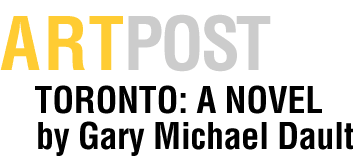“Absolutely, ma’am,” the young man
replied, dazzled equally by the beauty of both the fiercely sleek car and its
sleekly beautiful owner. “You can
depend on me.”
“I hope so.”
The waiter at Didier seated them with the
sort of elaborate fake deference Coal hated, presented them with menus, and
then scurried off to fetch water, rolls, butter—talismans of the Gustatory
Preliminary. After which task, he
then skulked about near their table until the two women simultaneously betrayed
expressions that meant decisions had been reached.
“Would you like to hear about tonight’s
specials?” he asked them, a tad late in the game.
“No” said Coal.
She hated the pseudo-lyricism of food descriptions. “To begin with, bring us a couple of
martinis.”
“Very dry, yes?”
Coal glared at him.
“Surely nothing else is really a martini,”
she informed him curtly. She
turned then to Joy, who was feeling a little marginalized by Coal’s sense of
command. “The service here is, as
you can see…well, rather trying,”
Coal told Joy, “but the food is lovely.”
The waiter was back with the drinks.
“Did I ask you if you wanted to hear Chef
Leroy’s special’s for tonight?
“Yes, you did,” Coal replied crisply.
“And I actually think we’ve decided,” Joy
told him, with what Coal felt was an undeserved smile, which served to soften
the moment by a little.
“And so what can I get you?”
“You can get us both cheese souffles,”
said Coal. “And before that, you
can bring us a mushroom terrine to share.” She turned to Joy.
“We don’t really want wine do we?
I’d just like to drink martinis.”
Joy nodded her assent.
“Very good, ladies,” said the waiter and
disappeared.
“Ladies?” said Coal to Joy.
“I guess he couldn’t say ‘very good, Women’,” replied Joy, with a half-hearted smile.
“I wish he hadn’t said anything at all,”
replied Coal. “But,” she continued,
smiling at Joy and squeezing her hand briefly, “enough about him. What
about you?”
“Well, as you guessed earlier, back at the
studio, it’s Cass. I’m getting a
bit concerned about him.”
“To tell you the truth,” said Coal, taking
the always clarifying first sip of her icy martini, “we’re all a bit concerned about him. He is the mayor, after all. And, if you don’t mind my saying so, a rather peculiar mayor
at that.”
“I know,” said Joy wearily. “And he’s peculiar in lots of ways, not
just politically.”
“Is he?”
“Decidedly. The reason I wanted to talk to you, though, is that lately
he’s been getting death threats.”
“I guess it would be tasteless if I told
you I wasn’t surprised.”
“Tasteless, but understandable. Nobody likes him, Coal.”
“Except you.”
“For some reason I can’t figure out, yes,
I do like him somehow.”
“He needs you?”
“I don’t think he knows I’m alive.”
Coal finished her first drink and flagged
the waiter to bring two more.
“That doesn’t sound like something you’d say, Joy. You’re not a masochist.”
“I never have been.”
“And you mustn’t start now,” said
Coal. “But how do these death
threats you mentioned come? On the
phone? By letter?”
“There have been notes.”
“Have you seen any of them?”
“I have one here,” said Joy, rummaging in
her bag. “This is more
or less typical of the ones I’ve looked at.”
She was about to hand the sheet of paper
across the table to Coal—and hesitated.
“It’s pretty weird,” she said.
“They always are,” Coal told her, taking
the paper from Joy.
Then she looked at it.
“My god!” she said.




